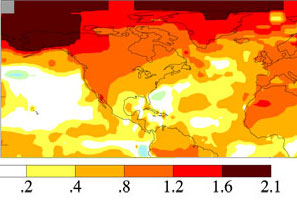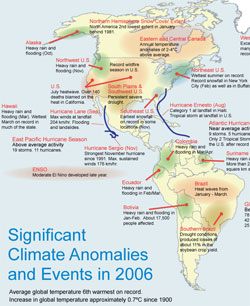2006 is third warmest year on record for the United States
2006 is third warmest year on record for the United States
mongabay.com
December 14, 2006
2006 will likely go down as the third warmest year on record for the United States according to scientists at NOAA’s National Climatic Data Center (NCDC) in Asheville, North Carolina. Globally, 2006 will have the sixth highest annual global temperature since record keeping began in 1880
NCDC says that the 2006 annual average temperature for the contiguous United States (based on preliminary data) will likely be 2°F (1.1°C) above the 20th century mean, making 2006 the third warmest year on record, just cooler than 1998 and 1934. 2006 has been a record year for wildfires which researchers say will continue to increase in frequency and intensity as climate continues to warm.
NCDC notes that higher temperatures produced a net increase in energy demand with 9 percent lower winter use more than offset by a 13 percent increase in summer use for air conditioning.
 NASA illustration showing average temperatures from 2001-2005 compared to a base period of temperatures from 1951-1980. |
NCDC reports that for the contiguous U.S. as a whole, five of the first seven months of the year were drier than average, pushing more than half the United States into moderate to exception drought conditions according to the U.S. Drought Monitor.
The government agency says that hurricane activity was classified as near-normal with nine named storms, the lowest number since 1995. El Niño helped suppress conditions conducive to hurricane formation in the Atlantic, but spurred a sharp increase in the number of Eastern Pacific hurricanes including three that made landfall on the Pacific coast of Mexico.
 click to enlarge |
Globally the annual temperature for combined land and ocean surfaces is expected to be sixth warmest on record for 2006 according to NCDC, which adds:
-
Including 2006, six of the seven warmest years on record have occurred since 2001 and the ten warmest years have occurred since 1995. The global average surface temperature has risen between 0.6°C and 0.7°C since the start of the 20th Century, and the rate of increase since 1976 has been approximately three times faster than the century-scale trend.
The extent of Arctic sea ice was second lowest on record in September, slightly above the extend measured in September 2005, which was the warmest year on record.
This article is based on a news release from NOAA’s National Climatic Data Center. It excerpts heavily from that release.